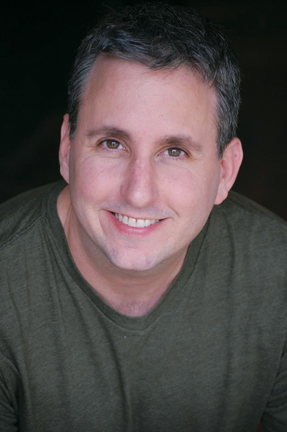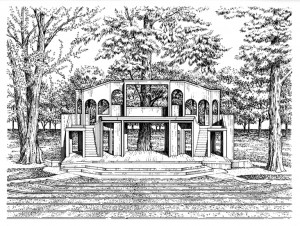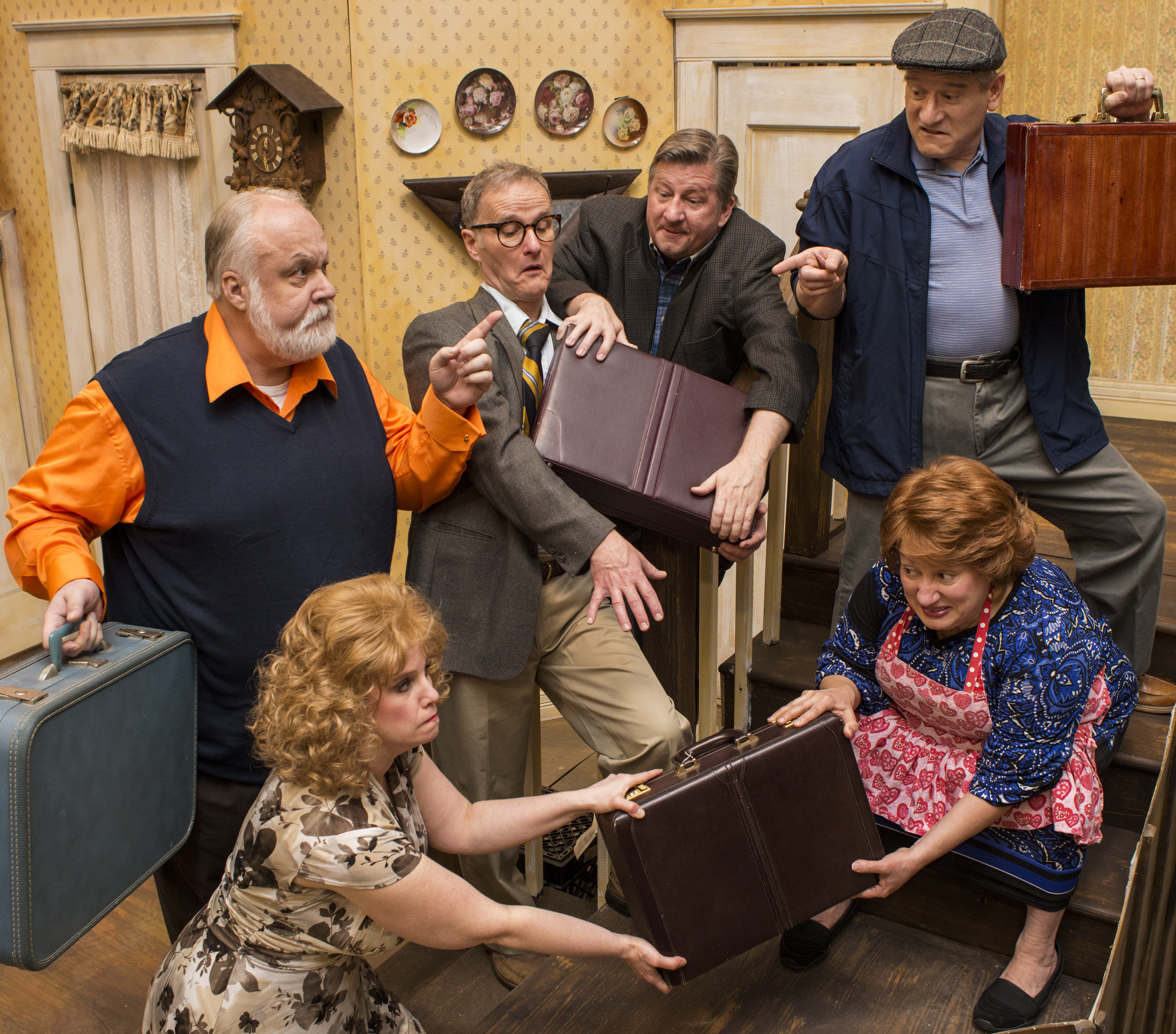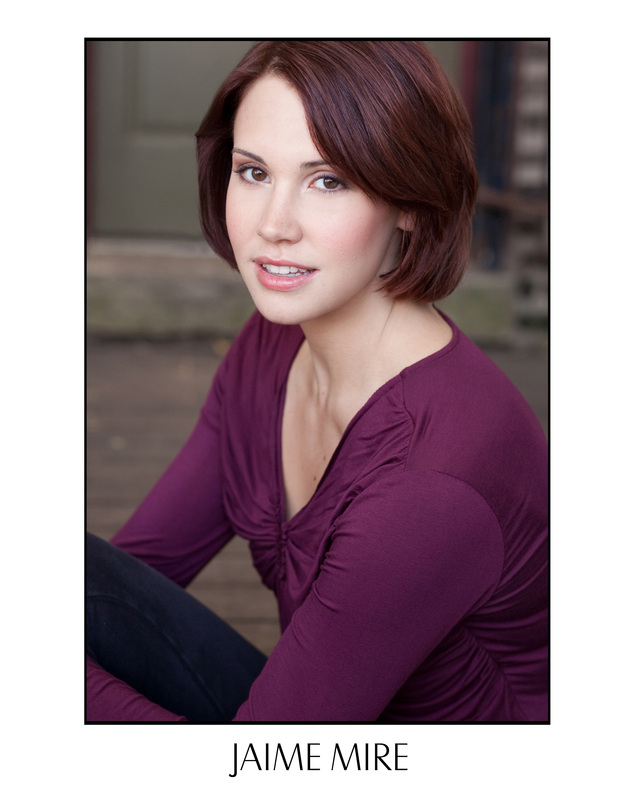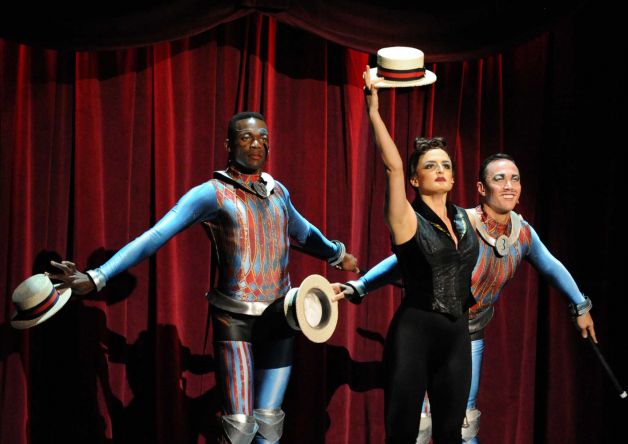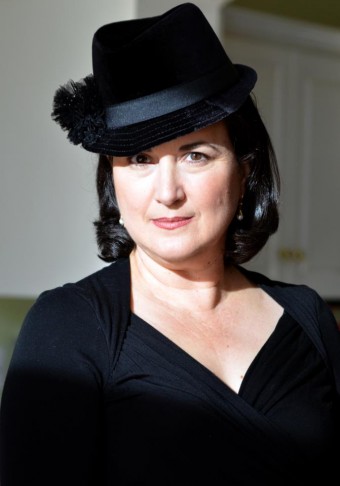Interview by Scott Dowd. Entire contents copyright ©Fearless Designs, Inc. All rights reserved.
This summer, Kentucky Shakespeare presents a return to one of Louisville’s favorite traditions – Shakespeare in the Park – in the beautiful outdoor setting of Old Louisville’s Central Park. New producing artistic director Matt Wallace and his staff have put together an ambitious season featuring three professional main stage productions – A Midsummer Night’s Dream, Henry V and Hamlet – along with ancillary performances by companies drawn from Kentucky Shakespeare’s 54-year history. Wallace, who worked as a Kentucky Shakespeare artistic associate for nine years, is passionate about that history and the part it is about to play in the organization’s future.
Matt Wallace: I grew up in Bowling Green and was first introduced to professional Shakespeare in the summer of 1990 when I was a drama student in the Kentucky Governor’s School for the Arts. They brought us to Central Park to see Macbeth and The Taming of the Shrew. I was sucked in immediately! I went off to college in St. Louis; and in 2001, Curt Tofteland asked me to come act in a summer season, which I thought was a great opportunity to get back to Kentucky.
SD: Did you have it in mind to move back to Kentucky permanently?
MW: I came down just to do a couple of shows and ended up staying.
SD: Which shows were you in that season?
MW: A Midsummer Night’s Dream and Love’s Labour’s Lost.
SD: I notice those are both on the program for this season.
MW: That’s right. It was a no-brainer for me. I met my wife during that production of A Midsummer Night’s Dream. It’s what brought me back to Louisville, and we haven’t done it since 2001. It’s also a natural fit to the venue and it’s popular with audiences.
SD: So you have been in Louisville since the 2001 season?
MW: Yes. I proposed to Tina Jo on the
C. Douglas Ramey Amphitheater stage; we
got married and now have two children! I worked with the company over nine years in almost every aspect: I toured the state, directed in the park, taught the camps and worked in the office.
SD: When Curt Tofteland retired in 2008 after 19 years as artistic director, did you think about trying for this position then?
MW: I actually did apply at that time. I was honored that he asked me to take over Shakespeare Behind Bars, and I’ve been doing that for the past six years. We built that into our own separate not-for-profit and currently have twelve programs running in two states.
SD: Will you continue to do that as well as being the head of Kentucky Shakespeare?
MW: I have stepped back in the administrative and facilitating roles. The one piece I can’t let go is directing our flagship program at Luther Luckett Correctional Complex in LaGrange. Next year will be our twentieth season out there. I still volunteer at the prison and I’m directing the inmates in Much Ado About Nothing. I plan to bring my professional cast out to perform for the inmates and our inmate ensemble will perform for them. I’m looking forward to that experience. When I came in 2001, Curt took us to the prison to see Titus Andronicus. Seeing that sense of truth and ensemble and commitment is a great way to kick off the process.
SD: How do you manage twelve different programs on a daily basis?
MW: I have a number of facilitators out there who assist me so I can just oversee the Kentucky Programs. Shakespeare Behind Bars founder/producing director Curt Tofteland and director of technology and communications Holly Stone have taken on some of my responsibilities with this transition.
SD: You were away from Kentucky Shakespeare for three years. What else were you doing during that time?
MW: I focused on Shakespeare Behind Bars full-time as well as directed children’s theatre at Derby Dinner Playhouse.
SD: You are directing two of this summer’s three main stage productions. This is such an ambitious season considering what Kentucky Shakespeare had become.
MW: When I came in last August and rearranged the office, I decided to cover the walls with pictures from the past. I wanted to honor the past as we look to the future. Doug Ramey, our founder, is right there watching over my efforts. This year we are even bringing back the tradition of putting on all three shows in one night at the end of the season. It’s nothing original – it’s just what they used to do.
SD: How are you going to achieve such an ambitious season?
MW: By using local, professional talent. Ninety percent of our summer staff – artists, technicians, actors and teachers – live here in Louisville. Even the small number of out-of-town talent is regional. Everybody we have this summer is invested in what we’re doing. This isn’t just a job for me or for them. We will actually produce the Shakespeare Festival this year for less money than has been spent in past years – which was one of my goals.
SD: You have also gone back to the tradition of showcasing Shakespeare by presenting a comedy, a history and a tragedy.
MW: That seemed like a natural fit being that it’s Shakespeare’s 450th birthday!
SD: You also have four ancillary productions this summer.
MW: We have these great theatre companies here that have connections to our company. The six members of Le Petomane Theatre Ensemble started working here the same time my wife and I joined the company. J. Barrett Cooper, founder of Savage Rose Classical Theatre Company, is, in addition to his other talents, one of the best fight choreographers around. Kathi E. B. Ellis, founder of ShoeString Productions, has a long history with us; and many of Walden Theatre’s folks have worked with Kentucky Shakespeare over the years. It’s a homecoming for all of us.
SD: In what shape did you find the company when you returned last August?
MW: I resigned in 2010, right after I directed the fiftieth anniversary production of Richard III, so I had been away for three years. I hadn’t walked in the park, hadn’t been in the office. This was a dream I had really let go. Coming back was, in some ways, like starting a new company. I really had to roll up my sleeves and clean things up in lots of different ways to restore the community’s respect and confidence. I had to rally and empower the staff so that we could pick up the pieces and start over. My theme this season is “Support YOUR Kentucky Shakespeare.” Since August we’ve been working to celebrate the fact that we are the oldest FREE Shakespeare company in the U.S., and it is my hope the community will join us in reasserting ownership of this precious part of our cultural history.
SD: The costs for these productions can’t be offset entirely by donations. Do you have an endowment?
MW: We don’t currently have endowments, but that is definitely in our future. A little less than one-third of our budget comes from our education programs. We are the largest touring arts education program in the Commonwealth. We serve about 50,000 students a year in all 120 counties. Last year we served our one millionth child. We also receive generous corporate donations from companies such as Brown-Forman, YUM! Brands, Humana and White Clay. We receive support from the Gheens Foundation, Metro Government, Kentucky Arts Council and the Fund for the Arts, as well as very generous personal donations. I like to remind folks that we are a charitable organization that offers a very professional product for free.
SD: Looking at the current budget and your resources, is it realistic to believe that can continue?
MW: I have no intention of changing that. Every seat at Kentucky Shakespeare this year will, once again, be free. And they are all VIP seats. We have a total of eight productions this summer. We are more than doubling the number of performances offered last summer with 56 performances over ten weeks. We are providing a free festival pretty much from the time the kids get out of school until they go back. This is something for families, for date nights, etc. We are also partnering with the Louisville Food Truck Association, so there will be a food truck at the park every night we have a performance. Plus, we have a liquor license so we can have our Brown-Forman bar there.
SD: Couldn’t people always bring their own wine?
MW: People have done that for years, but it has always been illegal to drink in the park. Since there is a police station right behind us, we did have a few patrons ticketed. But we’ve taken care of the legalities and we hope everyone will enjoy responsibly with us.
SD: In addition to local companies like Le Petomane Theatre Ensemble, Savage Rose Theatre Company, Walden Theatre and ShoeString Productions, a lot of community groups will be on stage this summer.
MW: Another objective this season is inclusivity. We will have a number of community groups performing every night – Governor’s School for the Arts, Down’s Syndrome of Louisville, our own Camp Shakespeare students and many others – who will provide pre-show entertainment at 7:15 p.m.
SD: That will surely attract new people to the park.
MW: That’s my hope. We are offering a Festival Passport: if you come to all eight main stage productions, we will give you a free T-shirt at the end of the season. This is a “Festival,” after all, and I want it to be a community event that lasts for ten weeks.
SD: Give me your director’s perspective on A Midsummer Night’s Dream.
MW: This play has a very personal connection for me, of course. I wanted it to be a love letter to Old Louisville. Old Louisville is the largest historic preservation district in the country to include only Victorian homes. To honor that designation, I set the production in the Victorian era. That works to accentuate the sexual repression at the beginning of the play and provides great contrast with the sylvan magic that occurs in the forest. We have a great ensemble cast to make that happen, and they will be doing all three of the shows.
SD: So all of these actors perform in three professional productions of Shakespeare in a single summer?
MW: Yes. Hamlet plays one of the mechanicals in A Midsummer Night’s Dream.
SD: That goes back to the Globe Theatre and Shakespeare’s original company.
MW: I’m not inventing anything new. My first job out of college was at Horse Cave Theatre, where I worked under the great Warren Hammick and Liz Fentress, who had a good model for rotating repertory. So we’re going to open with A Midsummer Night’s Dream for two weeks, June 11-22; then Henry V for two weeks, June 26-July 6; and Hamlet, July 10-13; followed by two weeks of performances during which we will rotate all three shows.
SD: That is a lot of theatre in a compact time frame.
MW: Think about what a “destination” model festival could be: someone can come to town for fifty hours and see three of our shows. While they’re here, of course, that patron is contributing to the local economy. Our product is free, but they will be staying at hotels and patronizing other businesses.
SD: All of Shakespeare lends itself to an outdoor setting, but none more so than
A Midsummer Night’s Dream. How are you using Central Park?
MW: It’s going to be a lot of fun. The play is magical and meant to be outdoors. One of the first phone calls I made was to Paul Owen, veteran scenic designer at Actors Theatre of Louisville. He has designed for me in Central Park before, and he designed our stage house more than twenty years ago. He created the C. Douglas Ramey Amphitheater. Last August, he and I went out to the stage house because it was in great need of repair. We looked at it and assessed what we needed to do to lay the foundation for this company.
SD: Why was the stage in such bad shape?
MW: Over the past three years we had built on top of the wood a lot and it was neglected. He and I came up with a plan to strip away the old rotten wood, and in April of this year, we concluded a year-long fund-raising effort to build a much sturdier new stage floor. We used the Globe Theatre as our starting point. At the Globe, they don’t change the set totally for each show. When you are doing eight shows, the set can’t be ultra specific. I also wanted to illuminate the beauty of this Olmsted Park where we will be performing. We plan to highlight the “three sisters”– three gorgeous trees that anchor the stage house. Paul came up with a great design that curves the set around the trees and thrusts into the audience as it does in the Globe Theatre. Casey Clark, director of production at the Louisville Palace, designed special lighting that will draw audience attention to those trees so they will be seen as they have never been before.
SD: Don’t the acoustics create some challenges for you as a director?
MW: Well, as you know from attending performances at the Amphitheater, we are usually locked into certain positions because of the floor mics. Thanks to several of our generous donors, for the first time in fifty-four years every actor will be wearing a wireless body microphone this summer – just like the PNC Broadway in Louisville productions!
SD: That will be a huge improvement!
MW: I think so. We are free now to let the actors work the space in new ways: they can be around the trees and in the shadow. We’re also going to start the show earlier
at 8 p.m. The first half of the show will
be played in natural light, just like at the Globe Theatre.
SD: Who is doing your costumes?
MW: Donna Lawrence Downs, an accomplished designer with a deep knowledge of historical garb, who also works on the prison programs. She’s part of a strong production team that includes people from UofL, Actors Theatre, Kentucky Opera, Louisville Ballet and Walden Theatre. Part of our goal is to employ local talent who have no work here in the summer. A good example is Katie Shade, a stage manager at Actors who usually goes away to a Shakespeare company in Massachusetts. She’s going to stay this summer and be our production manager. We want to keep this talent employed right here!
SD: You mentioned the opening
production will be Victorian. How about the others?
MW: Amy Attaway’s Henry V will be a contemporary take on the play. Hamlet will be a traditional Elizabethan production. I love the idea of presenting something that looks traditional with contemporary resonance in how it’s being played.
SD: I know you’ve tried to showcase Shakespeare’s breadth, but is there any element that ties these three particular plays together?
MW: Each of them has a play-within-a-play element. Going back to the traditions of the Globe, we want to acknowledge in some way that we are actors in a play. I love the statement at the beginning of Henry V that exhorts the audience to “imagine.” Let’s use our imagination. We’re not going to recreate the battle of Agincourt here, but we’ll tell the story through the language and the acting.
SD: That is what makes Shakespeare so fantastic. Everything is in the words.
MW: “Think when we talk of horses that you see them printing their proud hooves in the receiving earth.”
SD: It gives me chills just sitting here. You have had a tour of Hamlet out in the community. Is this new?
MW: I knew we were going to tour the schools with our eight-actor production of Hamlet, but this is the first time we have ever toured other parks in Louisville. At the beginning, my goal was to go to a couple as a test. We had such a great response that eight Metro Parks and one non-Metro Park in Lyndon participated.
SD: Some of your school performances are supported by the Fund for the Arts and some schools pay for their performances. But where did you get the money to play these nine parks??
MW: Over half the Metro Council is sponsoring this. Thirteen members supported us this year, and it’s just going to keep growing. I can’t wait to see what we do next year when we tour Macbeth!
SD: How many people could fit into Central Park on a given night?
MW: We can fit a thousand in there, plus people on blankets. This year we are also placing picnic tables at the top of the hill so people can purchase food from the food trucks and sit up there.
SD: I assume you will still pass the hat?
MW: Yes. We are providing a free public service, and I hope people will support us. You will also be able to send a text from your phone to make a ten dollar donation. I have actually reduced our camp costs this year, and we’re reducing the cost to schools to provide more outreach and support the idea that Shakespeare is for everyone. I want to make Shakespeare accessible!
SD: Tell me about Camp Shakespeare so parents can plan for next summer.
MW: Camp Shakespeare is a really fun experience for kids ages 4 through 18. We have different, age-appropriate programs in Louisville, Frankfort and Lexington camps. The Globe Players is our high school conservatory, and Brian Hinds of YPAS will be directing them in Love’s Labour’s Lost.
SD: You have a lot of great things happening. I can’t believe you are doing
it on a lower budget than in the past.
MW: We are! We are utilizing our talent and working with community partners in new ways.
SD: What is your vision for Kentucky Shakespeare’s next five years?
MW: For me, the future is about expansion and inclusivity. It’s about mobilizing the support in this community and getting people to understand that Shakespeare is for everybody. This 54-year-old tradition is ours! I also know that there are a lot of people like me who want to come home
to Kentucky Shakespeare.
For more information about Kentucky Shakespeare, go to kyshakespeare.com or call 502.574.9900.

